The Thin Film Solar PV Backsheet Market is estimated to be valued at USD 2.7 billion in 2025 and is projected to reach USD 3.2 billion by 2035, registering a compound annual growth rate (CAGR) of 1.8% over the forecast period. Early growth is supported by the integration of thin film modules in commercial and industrial applications, where lightweight, flexible, and durable backsheet solutions are preferred. Mid-period expansion is influenced by technological refinements in polymer formulations, enhanced UV and thermal resistance, and increasing module efficiency requirements. Later years reflect a stable upward trend as replacement cycles, new installations, and gradual penetration in emerging solar markets sustain demand. Year-on-year growth shows a moderate but consistent increase, indicating that while adoption is steady, the market remains conservative due to competition from crystalline silicon modules and cost sensitivity.
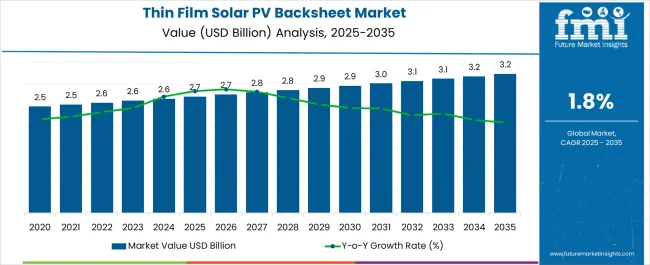
| Metric | Value |
|---|---|
| Thin Film Solar PV Backsheet Market Estimated Value in (2025 E) | USD 2.7 billion |
| Thin Film Solar PV Backsheet Market Forecast Value in (2035 F) | USD 3.2 billion |
| Forecast CAGR (2025 to 2035) | 1.8% |
The thin film solar PV backsheet market is advancing steadily due to the accelerating adoption of renewable energy technologies and the increasing demand for long term module durability. As solar installations expand globally, especially in regions with extreme environmental conditions, the need for high performance backsheet materials that provide electrical insulation, UV resistance, and moisture barrier properties has become critical.
Advancements in backsheet formulations tailored to thin film technologies are supporting module longevity and improving levelized cost of electricity. Regulatory policies favoring clean energy transition and declining solar installation costs are further contributing to the adoption of durable backsheet solutions.
With manufacturers focused on improving module output and long term reliability, the market for thin film solar PV backsheets continues to experience consistent growth aligned with global solar energy targets.
The thin film solar PV backsheet market is segmented by material, product, and geographic regions. By material, the thin film solar PV backsheet market is divided into Fluoride and non-fluoride. In terms of the product, the thin film solar PV backsheet market is classified into TPT-Primed, TPE, PET, PVDF, PEN, and Others. Regionally, the thin film solar PV backsheet industry is classified into North America, Latin America, Western Europe, Eastern Europe, Balkan & Baltic Countries, Russia & Belarus, Central Asia, East Asia, South Asia & Pacific, and the Middle East & Africa.
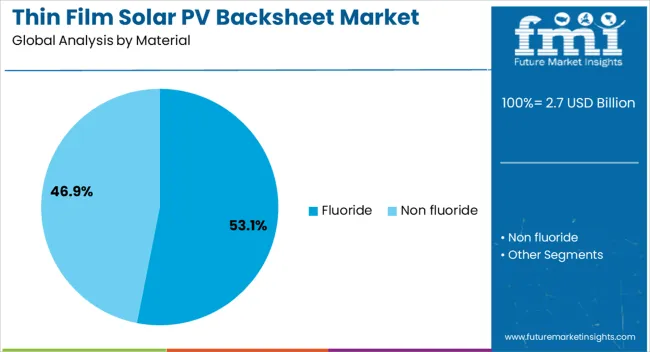
The fluoride segment is projected to account for 53.10% of total revenue by 2025 within the material category, positioning it as the dominant material choice. This preference is driven by the superior weatherability, UV protection, and chemical resistance that fluoride based films offer compared to alternative materials.
These properties are essential for ensuring backsheet performance over extended operational lifetimes, especially in regions with high solar radiation and variable climates. Additionally, fluoride films have demonstrated lower rates of cracking and delamination under thermal and mechanical stress, which significantly enhances module durability.
As module manufacturers prioritize reliability and warranty compliance, the use of fluoride materials in backsheet production has expanded, reinforcing their market leadership.
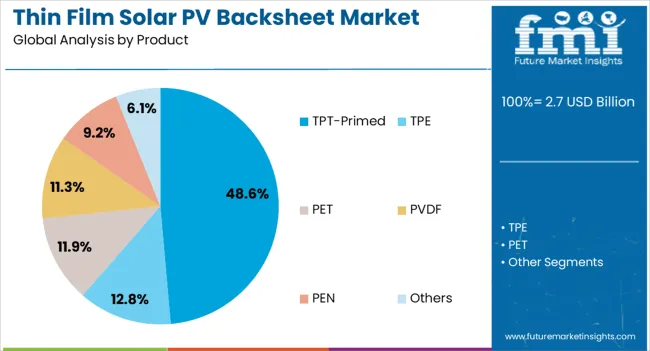
The TPT primed product segment is expected to contribute 48.60% of total market revenue by 2025, making it the most prominent product category in the market. This growth is supported by the product’s balanced combination of durability, adhesion properties, and compatibility with various encapsulants used in thin film modules.
TPT primed backsheets offer a proven solution for electrical insulation and environmental protection, while also enhancing process efficiency during lamination. Their ability to withstand harsh environmental conditions and maintain mechanical integrity over time has made them a preferred choice among module manufacturers.
The segment’s strong presence reflects the solar industry’s focus on proven, field tested solutions that ensure long term performance and reliability of PV installations.
The thin film solar PV backsheet market is driven by the increasing demand for renewable energy, cost-effectiveness, and growing adoption in emerging economies. Focus on durability and performance optimization continues to support market growth.
The thin film solar PV backsheet market is experiencing growth driven by the increasing demand for renewable energy. As the global push for cleaner energy sources intensifies, the adoption of solar power is expanding rapidly across residential, commercial, and industrial sectors. The thin film backsheet, which protects solar panels from environmental damage, is gaining importance as more solar installations are being deployed worldwide. The growing awareness of the benefits of solar energy in reducing energy costs and dependence on fossil fuels is a key driver of this market. Government incentives and policies supporting solar energy adoption are helping to accelerate market growth.
The cost-effectiveness of thin film solar panels, and the backsheets that support them, has made them an attractive option for large-scale solar power projects. These panels offer a more affordable alternative to traditional silicon-based panels, contributing to increased adoption in price-sensitive markets. The market for thin film backsheets is also driven by the need to optimize performance while keeping costs low. Backsheets play a critical role in protecting solar modules and improving their overall efficiency and longevity. As manufacturers continue to refine materials to balance cost, durability, and performance, demand for thin film solar PV backsheets is expected to rise.
Emerging economies are playing a pivotal role in the growth of the thin film solar PV backsheet market. Countries in regions such as Asia-Pacific, Latin America, and Africa are rapidly adopting solar energy solutions due to a combination of favorable weather conditions and rising electricity demand. Thin film solar technology, with its lower production costs and ease of installation, is particularly appealing to these markets. Governments in these regions are increasingly supporting the development of renewable energy infrastructure, creating significant opportunities for thin film solar panel manufacturers and backsheet suppliers. This regional growth is a key factor driving the overall expansion of the market.
As the demand for solar panels continues to increase, there is a growing focus on ensuring the durability and long-term reliability of the components, including backsheets. Thin film backsheets must be able to withstand harsh environmental conditions, including UV radiation, moisture, and temperature fluctuations, to maintain the efficiency of the solar modules over their lifespan. Manufacturers are investing in advanced materials and enhanced production processes to improve the performance of thin film backsheets, ensuring that they provide long-lasting protection. The market is also seeing increased interest in eco-friendly backsheets, as companies seek to meet growing consumer demand for environmentally responsible products.
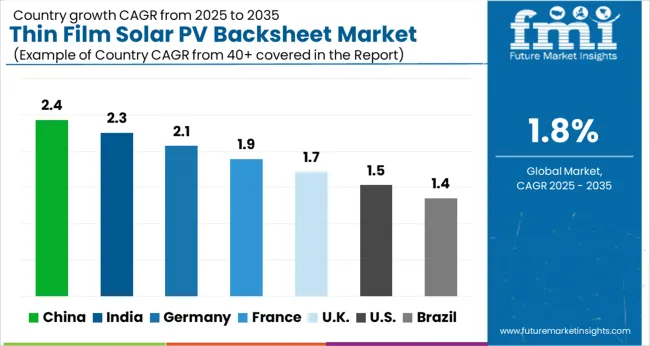
| Countries | CAGR |
|---|---|
| China | 2.4% |
| India | 2.3% |
| Germany | 2.1% |
| France | 1.9% |
| UK | 1.7% |
| USA | 1.5% |
| Brazil | 1.4% |
The thin film solar PV backsheet market is projected to grow globally at a CAGR of 1.8% from 2025 to 2035, supported by increasing demand for renewable energy and solar panel installations. China leads with a CAGR of 2.4%, driven by its large-scale adoption of solar power, government incentives, and growing emphasis on clean energy infrastructure. India follows at 2.3%, benefiting from its expanding renewable energy sector and government-backed solar initiatives.
France records 1.9%, supported by rising demand for solar solutions in both residential and commercial sectors. The UK grows at 1.7%, fueled by government programs aimed at promoting solar energy and the adoption of green technologies. The USA maintains a 1.5% CAGR, driven by consistent solar energy demand, state-level incentives, and increased residential and commercial solar installations. This growth outlook highlights Asia-Pacific as a major driver of solar panel adoption, with Europe and North America continuing to show steady demand through regulatory support and sustainable energy goals.
The UK is expected to achieve a CAGR of 1.7% during 2025–2035, in line with the global average. Between 2020–2024, the CAGR was about 1.5%, influenced by slower adoption rates of thin film solar technology compared to traditional panels. The projected increase in the CAGR is attributed to the growing adoption of solar energy driven by government incentives, the rise in residential solar installations, and the increasing focus on green energy.
During the 2025–2035 period, there will be a stronger emphasis on integrating solar technologies into commercial and industrial applications, which will drive demand for reliable and cost-effective backsheets. Government policies encouraging renewable energy adoption, alongside an increase in solar panel installations, will further contribute to this growth. Manufacturers are expected to focus on optimizing material performance and reducing costs to capture the growing demand.
China is projected to achieve a CAGR of 2.4% during 2025–2035, which is slightly higher than the global average of 1.8%. Between 2020–2024, the CAGR was about 2.0%, supported by strong growth in the solar energy sector, which has been a major focus of the government. The projected rise in CAGR can be attributed to China’s rapid expansion of solar installations, driven by substantial government backing, including subsidies and incentives for renewable energy. Moreover, the emphasis on solar energy in both urban and rural areas, coupled with the country's dominance in solar panel manufacturing, supports growth in the thin film backsheet market. China’s competitive advantage in manufacturing costs, combined with increasing demand for affordable, efficient, and durable solar products, is expected to further boost growth.
India is expected to achieve a CAGR of 2.3% during 2025–2035, surpassing the global CAGR of 1.8%. Between 2020–2024, the CAGR was about 1.8%, with growth driven by rising energy demand, increased awareness of renewable energy, and government initiatives like the National Solar Mission. The acceleration in the 2025–2035 period is due to the increased integration of solar energy solutions across both residential and commercial markets, driven by favorable policies and declining solar panel costs. As India focuses on expanding its solar capacity to meet growing energy needs, demand for reliable and affordable thin film backsheets will increase. Manufacturers will focus on producing cost-effective, durable backsheets to meet the growing demand in both domestic and export markets.
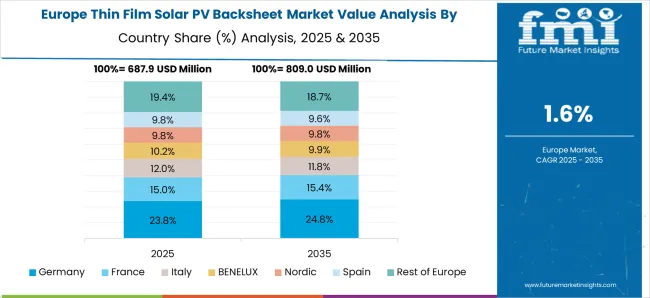
France is projected to achieve a CAGR of 1.9% during 2025–2035, slightly above the global average of 1.8%. During 2020–2024, the CAGR was about 1.7%, with slow but steady growth in the adoption of thin film solar panels. The rise in CAGR for the 2025–2035 period is expected due to the country’s ongoing commitment to increasing renewable energy capacity and meeting EU climate targets. The growing demand for solar energy solutions in both residential and commercial sectors, as well as government incentives for clean energy adoption, will drive demand for thin film backsheets. France is increasingly focused on integrating solar power into urban infrastructures, further contributing to the growth of the thin film market.
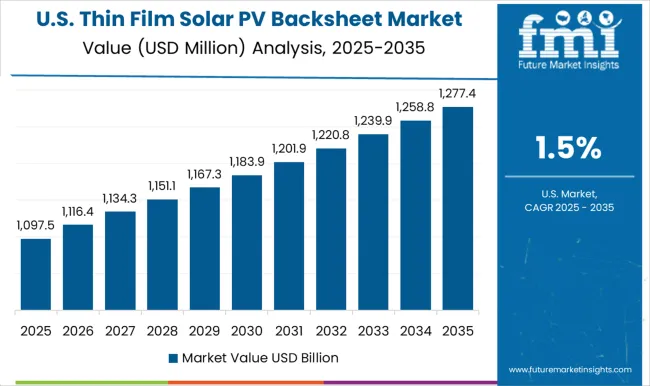
The USA is projected to achieve a CAGR of 1.5% during 2025–2035, lower than the global average of 1.8%. Between 2020–2024, the CAGR was approximately 1.3%, with growth driven by continued investments in solar energy infrastructure and a growing interest in renewable energy sources. The projected increase in CAGR is attributed to expanding solar power adoption in the residential sector, along with the increasing availability of affordable solar products. Although traditional silicon-based panels have dominated the USA market, thin film solar panels are becoming more appealing due to their cost-effectiveness and flexibility. Manufacturers are focusing on improving the durability and performance of thin film solar backsheets, catering to both commercial and residential needs.
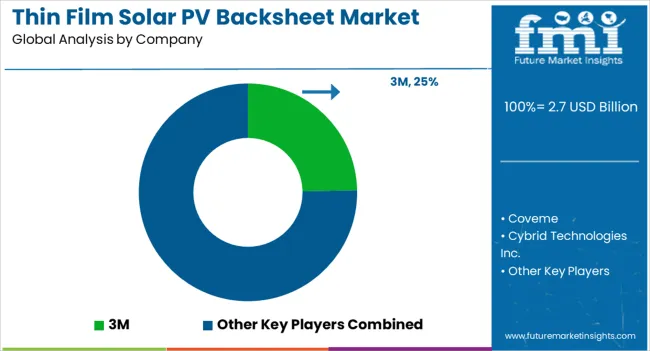
Coveme is a key player with a focus on producing cost-effective and reliable backsheets that ensure long-term solar energy production. First Solar is a prominent player, recognized for integrating thin-film technologies and providing durable backsheets that enhance the overall efficiency of photovoltaic modules. Krempel GmbH provides high-performance materials for thin film backsheet production, with a focus on environmental protection and long-term stability. Madico Inc. specializes in advanced backsheet technologies that reduce degradation and improve energy yield. RenewSys India Pvt. Ltd and SILFAB SOLAR INC have strengthened their positions by offering reliable and affordable backsheet solutions suited for diverse climates.
Toyal Toyo Aluminum K.K. focuses on creating lightweight and durable materials that enhance the performance of thin-film solar panels. Tesa SE, Toppan USA, Inc., and Zhejiang Zhengxin Photovoltaic Technology Co., Ltd are continually innovating to provide high-quality backsheet solutions that meet the growing demand for sustainable and high-efficiency solar panels. Key competitive strategies in this market include continuous research and development in material science to improve efficiency and reduce costs. Manufacturers are focusing on expanding production capacity to meet the increasing global demand for solar installations. The competition is also driven by a focus on improving the durability, performance, and cost-effectiveness of backsheets, catering to both commercial and residential solar energy markets.
| Item | Value |
|---|---|
| Quantitative Units | USD 2.7 Billion |
| Material | Fluoride and Non fluoride |
| Product | TPT-Primed, TPE, PET, PVDF, PEN, and Others |
| Regions Covered | North America, Europe, Asia-Pacific, Latin America, Middle East & Africa |
| Country Covered | United States, Canada, Germany, France, United Kingdom, China, Japan, India, Brazil, South Africa |
| Key Companies Profiled | 3M, Coveme, Cybrid Technologies Inc., DUNMORE, First Solar, Krempel GmbH, Madico Inc, RenewSys India Pvt. Ltd, SILFAB SOLAR INC, TOYO ALUMINIUM K.K, Tesa SE, Toppan USA, Inc, and Zhejiang Zhengxin Photovoltaic Technology Co., Ltd |
| Additional Attributes | Dollar sales projections, market share by region and material type, growth trends in solar installations, competitive landscape, and demand for durable, cost-effective backsheets in residential, commercial, and industrial sectors |
The global thin film solar PV backsheet market is estimated to be valued at USD 2.7 billion in 2025.
The market size for the thin film solar PV backsheet market is projected to reach USD 3.2 billion by 2035.
The thin film solar PV backsheet market is expected to grow at a 1.8% CAGR between 2025 and 2035.
The key product types in thin film solar PV backsheet market are fluoride and non fluoride.
In terms of product, tpt-primed segment to command 48.6% share in the thin film solar PV backsheet market in 2025.






Our Research Products

The "Full Research Suite" delivers actionable market intel, deep dives on markets or technologies, so clients act faster, cut risk, and unlock growth.

The Leaderboard benchmarks and ranks top vendors, classifying them as Established Leaders, Leading Challengers, or Disruptors & Challengers.

Locates where complements amplify value and substitutes erode it, forecasting net impact by horizon

We deliver granular, decision-grade intel: market sizing, 5-year forecasts, pricing, adoption, usage, revenue, and operational KPIs—plus competitor tracking, regulation, and value chains—across 60 countries broadly.

Spot the shifts before they hit your P&L. We track inflection points, adoption curves, pricing moves, and ecosystem plays to show where demand is heading, why it is changing, and what to do next across high-growth markets and disruptive tech

Real-time reads of user behavior. We track shifting priorities, perceptions of today’s and next-gen services, and provider experience, then pace how fast tech moves from trial to adoption, blending buyer, consumer, and channel inputs with social signals (#WhySwitch, #UX).

Partner with our analyst team to build a custom report designed around your business priorities. From analysing market trends to assessing competitors or crafting bespoke datasets, we tailor insights to your needs.
Supplier Intelligence
Discovery & Profiling
Capacity & Footprint
Performance & Risk
Compliance & Governance
Commercial Readiness
Who Supplies Whom
Scorecards & Shortlists
Playbooks & Docs
Category Intelligence
Definition & Scope
Demand & Use Cases
Cost Drivers
Market Structure
Supply Chain Map
Trade & Policy
Operating Norms
Deliverables
Buyer Intelligence
Account Basics
Spend & Scope
Procurement Model
Vendor Requirements
Terms & Policies
Entry Strategy
Pain Points & Triggers
Outputs
Pricing Analysis
Benchmarks
Trends
Should-Cost
Indexation
Landed Cost
Commercial Terms
Deliverables
Brand Analysis
Positioning & Value Prop
Share & Presence
Customer Evidence
Go-to-Market
Digital & Reputation
Compliance & Trust
KPIs & Gaps
Outputs
Full Research Suite comprises of:
Market outlook & trends analysis
Interviews & case studies
Strategic recommendations
Vendor profiles & capabilities analysis
5-year forecasts
8 regions and 60+ country-level data splits
Market segment data splits
12 months of continuous data updates
DELIVERED AS:
PDF EXCEL ONLINE
Thin Film Solar Cells Market Size and Share Forecast Outlook 2025 to 2035
Thin Film Coatings Market Size and Share Forecast Outlook 2025 to 2035
Thin-film Platinum Resistance Market Size and Share Forecast Outlook 2025 to 2035
Thin Film Platinum Resistance Temperature Sensor Market Size and Share Forecast Outlook 2025 to 2035
Thin Film Photovoltaics Market Size and Share Forecast Outlook 2025 to 2035
Thin Film Encapsulation TFE Market Size and Share Forecast Outlook 2025 to 2035
Thin Film Battery Market Size and Share Forecast Outlook 2025 to 2035
Thin Film and Printed Batteries Market Trends - Growth & Forecast 2025 to 2035
Thin Film Photovoltaic Modules Market
Solar PV Module Market Size and Share Forecast Outlook 2025 to 2035
Solar PV Recycling Market Size and Share Forecast Outlook 2025 to 2035
PVC Cling Film Market Size and Share Forecast Outlook 2025 to 2035
PVDC Coated Film Market Growth and Outlook 2025 to 2035
Solar Photovoltaic (PV) Market Size and Share Forecast Outlook 2025 to 2035
Solar Control Window Films Market Size and Share Forecast Outlook 2025 to 2035
On Grid Solar PV Market Size and Share Forecast Outlook 2025 to 2035
Utility Solar PV EPC Market Size and Share Forecast Outlook 2025 to 2035
Rooftop Solar PV Module Market Size and Share Forecast Outlook 2025 to 2035
PV Module Encapsulant Film Market Analysis by Material Type, Application, Thickness, Weight, End-Use, and Region Forecast through 2035
Flexible Thin Film Market Trends - Growth & Forecast 2025 to 2035

Thank you!
You will receive an email from our Business Development Manager. Please be sure to check your SPAM/JUNK folder too.
Chat With
MaRIA